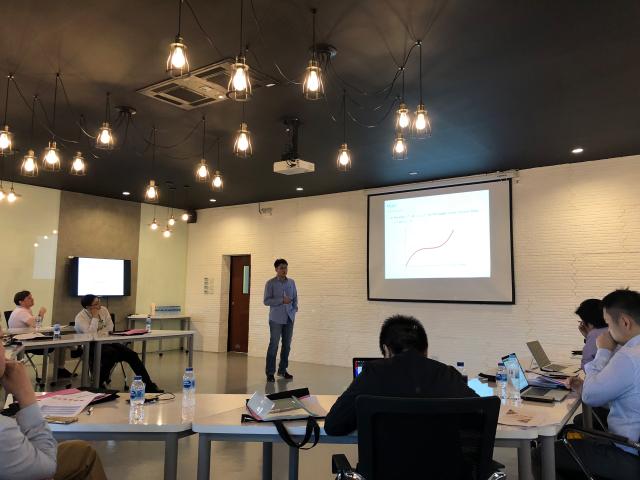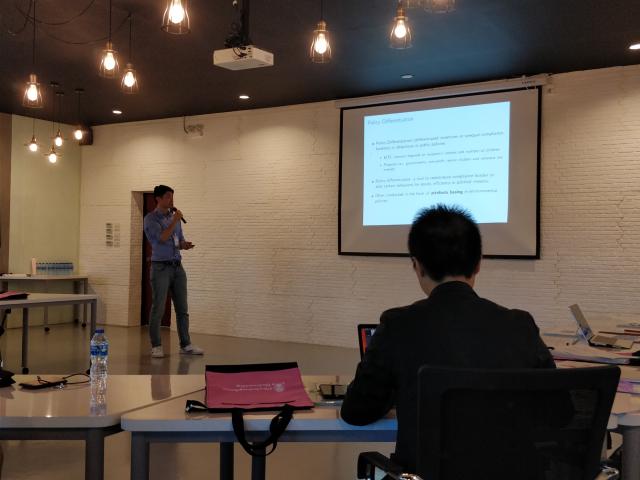
Scholars from Peking University (PKU), Seoul National University, Kyoto University, Nanyang Technological University (NTU), Academia Sinica and Chulalongkorn University attended the Asian Economic Institutes Workshop held at Bangkok's Chulalongkorn University from April 29 to 30, 2019.
So far, the Asian Economic Institutes Workshop has been held for five consecutive years since its inception at Japan's Kyoto University in 2014. This year marked the sixth conference and the Chulalongkorn University was the newly-included member. The previous conference was respectively held at Academia Sinica in 2005, China Center for Economic Research (CCER), Peking University in 2016, South Korea’s Seoul National University in 2017 and Singapore’s Nanyang Technological University in 2018.
This year's workshop focused on the latest research achievements in experimental economics, behavioral economics and applied microeconomics. Professor Worawet Suwanrada, dean of Faculty of Economics at Chulalongkorn University, gave a welcome speech as the host before the workshop started.
A total of 13 papers were presented at the following symposium. The attendees shared their researches according to the agenda, covering academic areas of experimental economics, behavioral economics and applied microeconomics. Scholars from different countries and universities gave supplements and comments after every presentation finished, and exchanged ideas on research methods as well as research results.
Assistant Professor Hu Ju and Assistant Professor Xing Jianwei, both from National School of Development at Peking University, gave presentations respectively themed “Robust Persuasion of a Privately Informed Receiver” and “Cars or Trucks? The Impact of Attribute Basing in Fuel Economy Regulations”.
Hu’s research considered optimal information disclosure by a sender when the receiver had private information, about which the sender had only limited knowledge. He found that when the sender used the “worst-case expected payoff” to evaluate the effects of every way of disclosing information, the sender’s optimal value could be achieved by a “linear-contingent-payoff” information structure. In this way, the sender’s contingent payoff was a linear function of the receiver’s private belief. This optimal information structure fully secured the sender in the sense that the sender’s worst case expected payoff was equal to the payoff that the sender could obtain when the receiver didn’t have private information.

Xing’s research took the discrepancy between cars’ and trucks’ energy consumption standards in the automobile industry as an example, and he used the structural econometric model to quantify the impacts on consumer surplus, firm profits and environmental externalities caused by the dual standards. His research revealed that the less-stringent standards set for light trucks led to the rising sales of SUVs and pickup trucks and the increase in truck manufacturers’ profits, but meanwhile gave rise to the decline in car manufacturers’ profits and more transportation-related energy consumption as well as more serious environmental pollution in the whole society.

Yohanes Eko Riyanto from NTU gave a presentation titled “Persuading Buyers to Act Socially Responsible: An Experimental Investigation” and Chia-Hui Chen from Kyoto University shared his paper “An Entry Game with Learning and Market Competition” with attendees. Dmitry Shapiro from Seoul National University gave a report named “Incentives of Low-Quality Sellers to Disclose Negative Information: Experimental Analysis” and Ting Yuen (Terry) Cheung from Academia Sinica introduced his research findings on “Child Labor and Education Outcome”. Nuarpear Lekfuangfu from Chulalongkorn University gave a report with the theme of “Hidden Wealth: Asset Holdings and Land Acquisition Strategies of Political Household”.